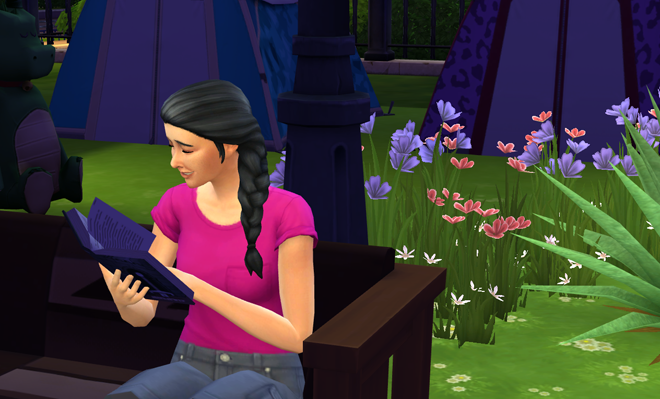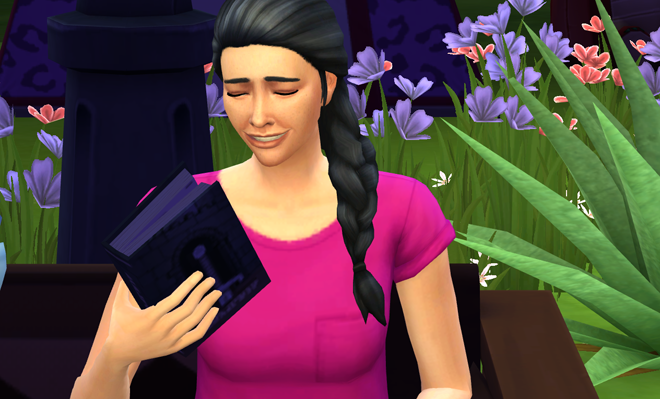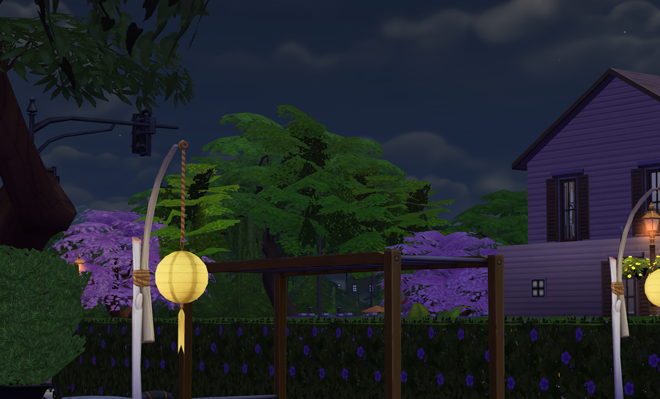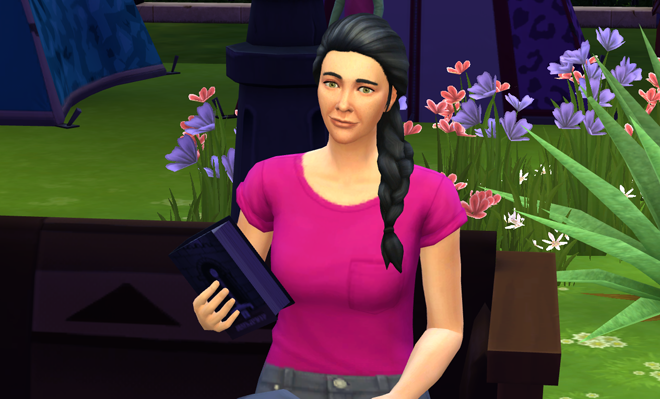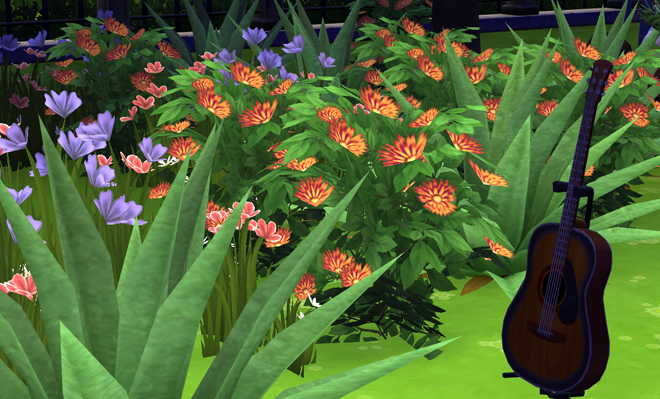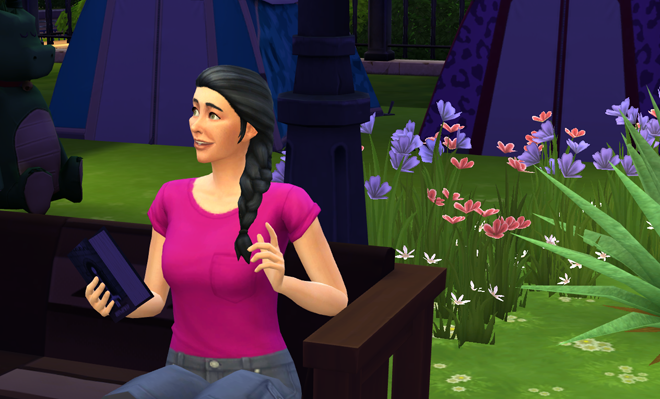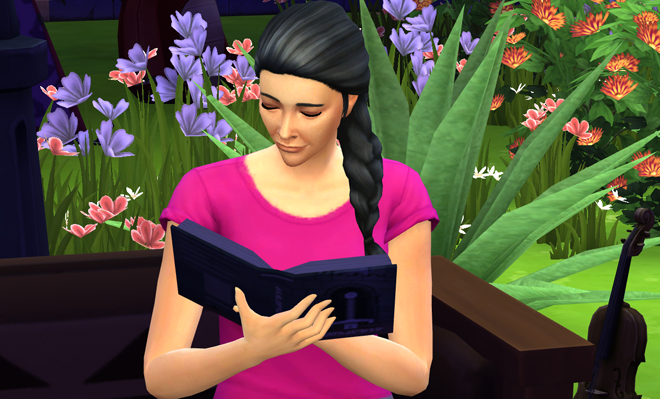I often wonder at how it is that we find the poems that we need at exactly the time we need them.
In elementary school, I remember coming home one day after having felt left out at school. How was it that, while I liked everybody, I wasn’t able to find my place within the groups? How was it that Lisa, who always looked so cute in her Brownie uniform, could make the whole class laugh with her? How could I move from standing outside the circle to finding a place within it?
That afternoon, I picked up a book of collected poems and opened to a random page.
I’m Nobody! Who are you?
Are you – Nobody – too?
Then there’s a pair of us!
Don’t tell! they’d advertise – you know!How dreary – to be – Somebody!
How public – like a Frog –
To tell one’s name – the livelong June –
To an admiring Bog!
— Emily Dickinson
Even now, that poem brings a smile. When I first read it as a child, I felt such a rush of recognition. I was not alone! There was someone else who also felt that she was “a nobody!” And not only that, this someone else was a poet! Emily Dickinson! My heart opened in that instant, the way our hearts do when we meet kindred spirits. I memorized the poem right then, so that I’d have it in my pocket the next time I felt excluded.
Through the coming weeks, and months, and years, after discovering that poem, I began to notice the other “nobodies”–and to rejoice when I found them. Sometimes, the pair of us would take our lunches together, or spend the long recess hour walking through the back fields sharing our secret stories of castles and pirates, or we might just look up during reading hour and smile to each other, knowing that, nobodies, both of us, we were not alone.
It was a poem that changed my experience of solitude and the feeling of social exclusion, a poem that helped me notice others who also felt excluded so that I could reach out, and we could, together, enjoy the friendship of those who stand on the periphery, looking in.
I was fortunate to grow up in a home where books and poems, pianos and trumpets, and films and plays were the topics of conversation at the dinner table. Though I was often too young to join into the analysis of “Lord of the Flies,” “Tess of the D’Ubervilles,” or “Far from the Madding Crowd,” I soaked up my brother’s enthusiasm, my sister’s compassion, and my mother’s interpretation of style and theme. Literature, I learned from an early age, has the power to help us make sense of this confusing life.
A few years after coming upon the Dickinson poem, I discovered William Carlos Williams’ “The Red Wheelbarrow.” This poem, too, described a feeling that I thought no one else shared: that moment when one is present and time seems to stop.
I had tried to talk with my friends about that experience, but they didn’t understand. We were just kids. My sister nodded and changed the subject. I didn’t have the vocabulary to express this experience or the feelings accompanying it to my parents. I began to wonder if no one else felt this–and was I ok to be experiencing this, or was something wrong with me?
The writing of Thoreau, Emerson, and John Muir helped–I found the word “transcendence” in their writing, so, at least to myself, I could call that experience “moments of transcendence.” I poured through as much of their writing as I could find, looking for descriptions of what this moment felt like to them, and I came out empty-handed.
Then, again just thumbing through a book lying on a table at home, I found Williams’ “The Red Wheelbarrow.”
so much depends
upona red wheel
barrowglazed with rain
waterbeside the white
chickens.
— William Carlos Williams
This is it. This little poem, with its wheelbarrow-shaped stanzas, expresses what it is like–one moment, and everything is clear, and beauty is in everything.
That joy returned–that recognition that another person felt what I had felt–that I wasn’t alone, and that this experience is part of what it is to be a person on this planet.
I tucked that poem into my pocket, too, and for decades after, I would pull it out when I needed to know that others felt this, too. Not to be alone in one’s deepest feelings! What a gift a poem brings.
This whole bundle of reflections on the gift of a poem comes to me now because of a recent meeting with a poem which once again expresses to me an experience that I haven’t been able to talk about with many others and that I felt was perhaps one of those experiences that an individual moves through alone.
It’s the experience of time and timelessness, stillness within movement, the vast sense of essence that infuses form, and the shift from form to essence.
I found Wittgenstein a few months back, almost by accident, looking for esoteric quotations that I could use for onezero, the alien child in Goofy Love. It was meant to be a joke, but instead, I discovered that Wittgenstein was expressing what I had learned through living! He provided the theoretical framework, but not the feeling.
It takes a poem to convey a feeling.
And again, in my life, I found that when I was ready, the poem that I needed found its way to me. My friend Marty shared with me “Interlude” from Lana del Rey’s album Honeymoon. I didn’t recognize the parenthetical title, Burnt Norton. I took it for a songwriter who helped Lana with the lyrics, perhaps.
And how was it that Lana knew that “Time present and time past” meet in the future?
I felt a chill reading her lyrics. This is something that I know!
Marty and I talked about the meaning. What is the rose garden?
A few weeks later, Marty tweeted lines of poetry. I was stopped by their beauty. Before I realized this was an original poem, I googled a few lines. There was no direct match, but I was led to “Burnt Norton” in full.
How can it be that I am only just now discovering this poem?
The collection it comes from has been beside me for so much of my life. Growing up, T.S. Eliot’s Four Quartets was on a bookshelf in the upstairs den. I looked at its spine while practicing the trombone.
One night when my brother and his best friend babysat me, and I was allowed to stay up late with them, watching scary movies, it was the cover of Four Quartets that my eyes rested on when the movie was too frightening to view.
In high school, I finally grew curious enough to open the book at a random page, but then, none of the poems spoke. I discounted Eliot–his words didn’t reach me.
Three decades later, after my grandfather passed, I received a bag of his books. Four Quartets was among them. The book remained closed and musty, shut by my idea that Eliot had no words for me.
But here I was now, finding once again my deepest experiences and feelings speaking from within a poem. How did it happen that I was led, by a friend and a search engine, to this poem now, at this time, when its words are ripe for me?
Go, go, go, said the bird: human kind
Cannot bear very much reality.
Time past and time future
What might have been and what has been
Point to one end, which is always present.
–T. S. Eliot
How much life I had to live in order to be able to hear these words!
And if I hadn’t read Wittgenstein just before, would my mind be primed for considering the movements of essence through form?
I write all of this in the first person–my own story of poems that have saved me. But this isn’t just my story. This is the story of every reader who, at a critical moment, has been led to a work of literature that has provided a tether, a lifeline, a kite string, so that that reader’s soul could feel that it wasn’t so very much alone.
This is what we give as writers. And this is the gift we receive as readers. To pass it forward, let the rhizome of meaning, experience, and word connect you to the kindred.

